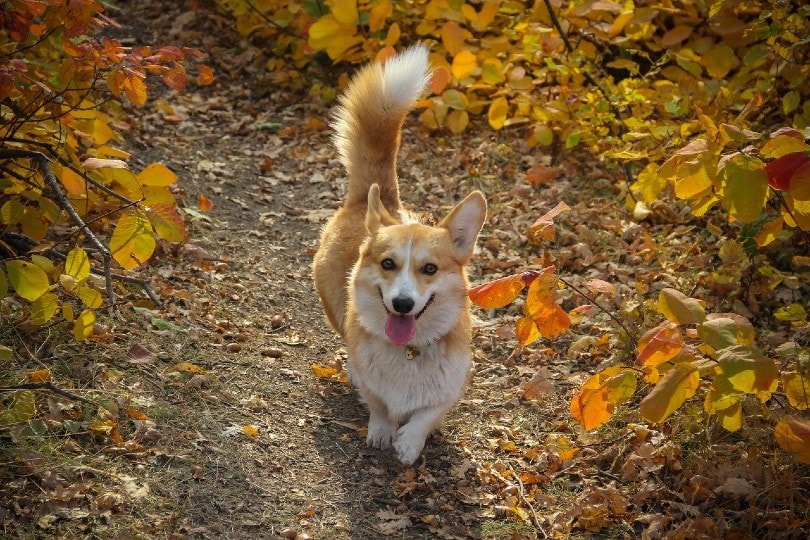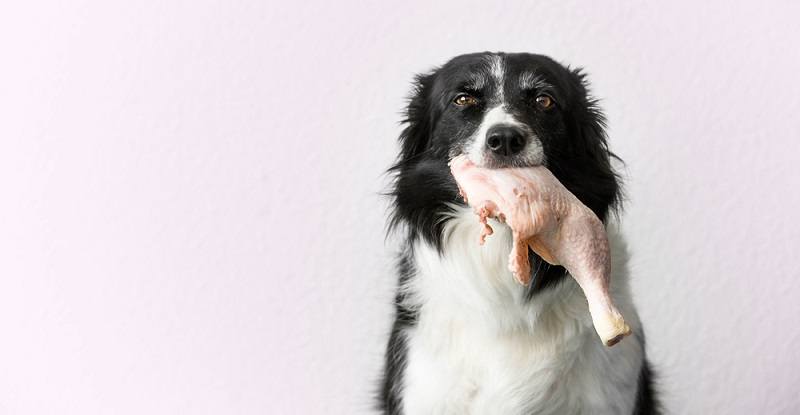Height:
22-26 inches
Weight:
30-45 pounds
Lifespan:
10 to 15 years
Colors:
Most commonly solid black, cream, red, or brown
Suitable for:
Families
Temperament:
Affectionate and friendly
The Goldendoodle is a lovable and friendly dog that makes an ideal family pet. They were first bred in the early 1990s and are a cross between the Golden Retriever and Poodle. They were bred in order to produce a large friendly dog not prone to shedding, and thus, the Goldendoodle was born. Their size can vary widely, depending on the parents, but they are typically medium-sized dogs. While they make great family lapdogs, they are a versatile breed and have been used as guide dogs and service dogs. Their keen sense of smell has also earned them a successful reputation as sniffer dogs. The Goldendoodle is still a fairly young crossbreed, and many puppies available today are the result of first-generation litters from the breeding of Golden Retrievers and Poodles.
They are highly social dogs and will form strong bonds with their owners. That said, they can be shy and early socialization is key. If you are looking for a guard dog, the Goldendoodle is not a great choice, as they are known to be quiet dogs who won’t bark at much.
Goldendoodles are not yet recognized by the American Kennel Club. That said, the breed’s popularity is on the rise due to their low-shedding quality, friendliness, and lovable, affectionate nature.
Golden Retriever Poodle Mix Puppy — Before You Buy
What’s the Price of Goldendoodle Puppies?
Goldendoodle puppies are not cheap. Most Goldendoodle puppies come from first-generation breeding and are rarely bred together. This makes a rare and somewhat difficult puppy to find and makes prices for them vary widely. The price will also depend on the breeder, location, availability, and especially size, as Goldendoodles can have big variations in size depending on the parents.
That said, if you are in the market for a Goldendoodle puppy, the average prices you can expect to pay are around $2,000-2,300 for a medium to large dog and around $2,600 for a miniature. There are rare cases of petite or micro-sized Goldendoodles, and you can expect to pay up to $3,600.
While these puppies have some of the most expensive prices for a crossbreed that you’ll likely find, they are also some of the cutest puppies you’ll ever see. Keep this in mind when going to see one, as you might not be unable to resist!
3 Little-Known Facts About Goldendoodles
1. Hypoallergenic
While no dog is completely hypoallergenic, the Goldendoodle comes close. Most Goldendoodles hardly shed their coats, making them a great choice for owners with allergies. That said, they can still have dandruff, and their saliva and urine can also set off allergies.
2. Extremely friendly
Goldendoodles are extremely friendly, almost to a fault. They are known for hardly ever barking, even when there is a loud knocking at the door. While this is great for owners who don’t want a barking dog, it also means that they are terrible guard dogs.
3. Water loving
Goldendoodles have an almost universal, innate love for water. They are known for leaping into any body of water they see, whether it be a pool, river, or the sea. While they will happily swim with you and your family, it can be dangerous if it’s a pounding ocean breaker or a fast-flowing river. Also, you may want to stand back when they get out, as their thick coat can shake off impossible amounts of water!
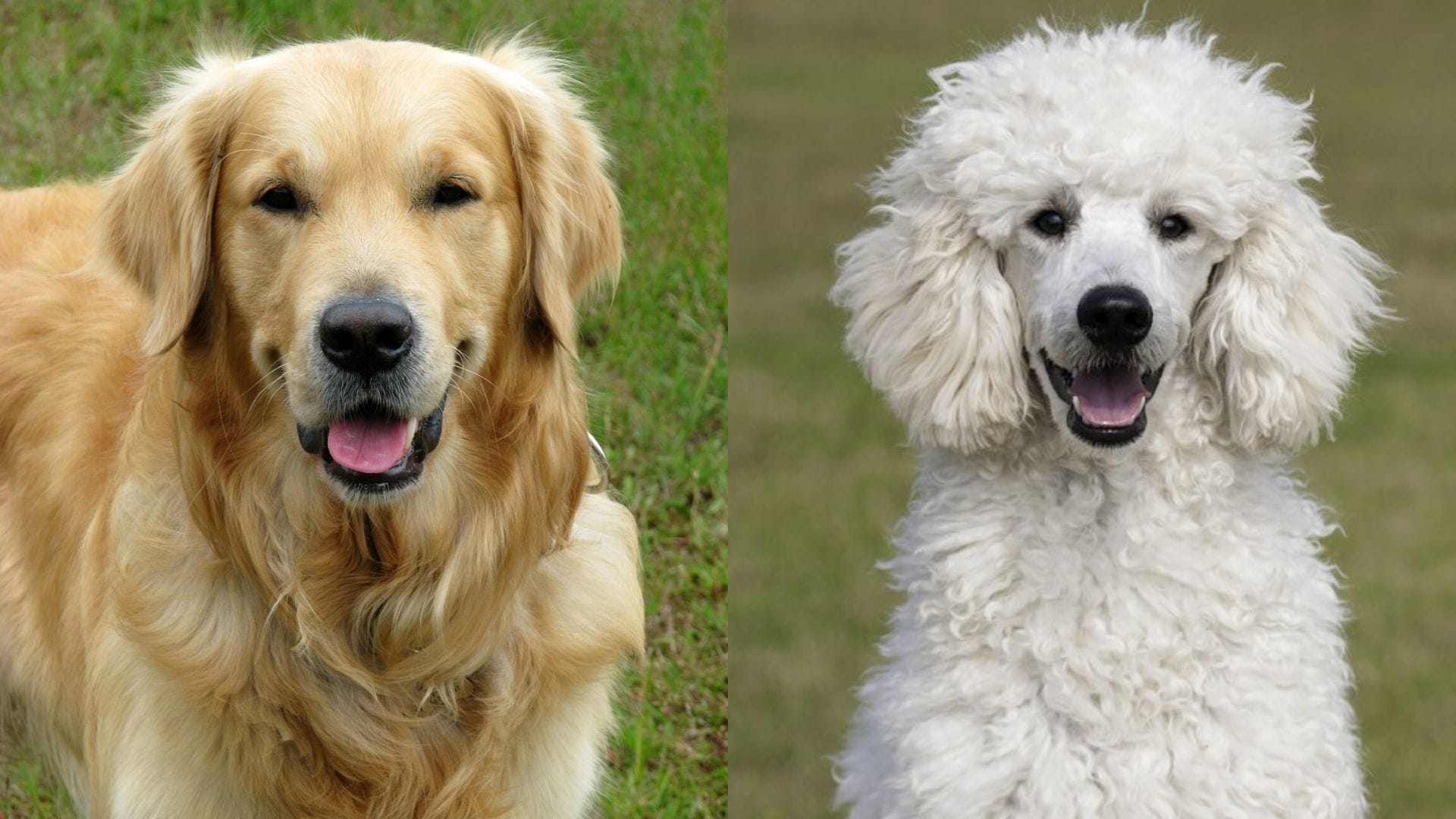
Temperament & Intelligence of Goldendoodles
Are Goldendoodles Good for Families?
Yes! They are a highly playful breed who loves to socialize and be around their owners as much as possible. They are especially great if you have children around, as they are full of energy and love to play. They are also safe to have around young kids, as they aren’t known for biting. In fact, it’s been shown that crossbreeds with retriever lineages are five times less likely to bite a child than a Shepherd or Doberman.
- Related Read: Labradoodle vs. Goldendoodle: What’s the Difference?
Does This Breed Get Along With Other Pets?
Goldendoodles in general will make fast friends with other dogs and pets, including cats. Their friendly and curious nature will ensure that even the grumpiest of dogs or cats will likely love them.
That said, all dogs are unique, and male/female hierarchies can also play a big part.

Things to Know When Owning a Goldendoodle
Food & Diet Requirements
Goldendoodles are active dogs, and they need a diet of high-quality, nutrient-rich foods to keep them healthy and happy. Dry dog pellets high in myriad nutrients are ideal, but larger Goldendoodles will benefit greatly from additional protein. Pellets are also great for general dental hygiene and helpful in removing tartar buildup. Dry food should be supplemented with good quality canned wet food, which is a good way to add moisture to their diet.
Goldendoodles can be fairly susceptible to food allergies. Common food allergies come from foods like corn, soy, and dairy and should be avoided wherever possible. Like all dogs, your Goldendoodle needs constant access to fresh, clean water.
Dogs need around 25-30 calories per pound per day to maintain a healthy weight, and the average Goldendoodle weighs in at an average of 30-45 pounds. This means they’ll need to get about 750-1,350 calories a day to maintain a healthy weight. Of course, Goldendoodles can vary greatly in size, and their caloric requirements need to be adjusted accordingly.
Exercise
Goldendoodles have above-average energy levels and will need daily exercise in order to stay healthy and happy. Growing puppies will especially need loads of exercise and play to burn off excess energy. A common rule of thumb is 5 minutes for every month of age, twice a day until adult. This would mean a 5-month-old Goldendoodle puppy should get around 25 minutes of exercise twice a day.
Adult and growing Goldendoodles love to swim, which can provide them with valuable exercise. Their playful nature and high agility are great for catching balls and sticks.
Because Goldendoodles can have such variations in size, their exercise needs will vary too. For example, a miniature Goldendoodle will require far less yard space and exercise than a larger one.
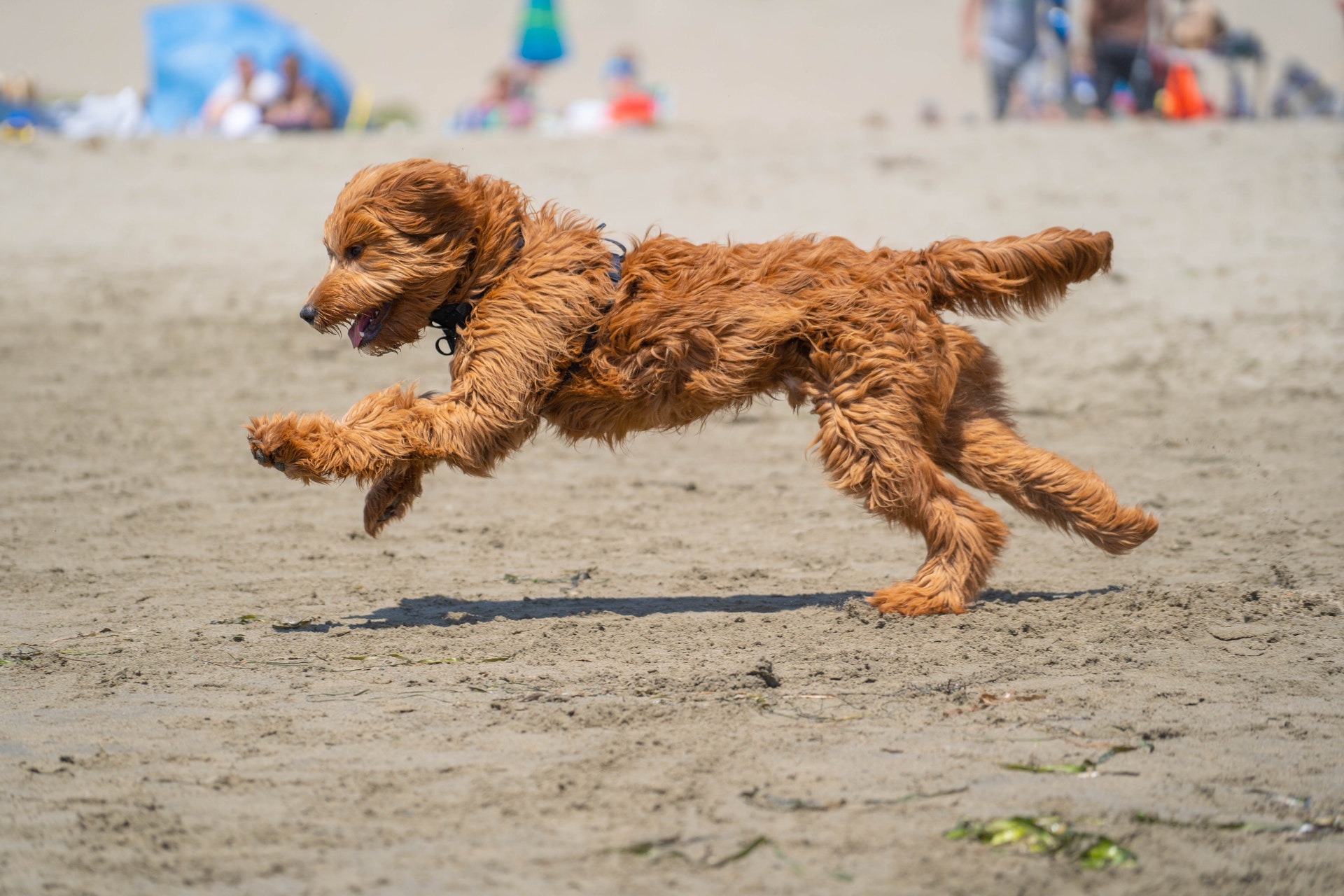
Training
Goldendoodles are highly intelligent and eager to please, so this makes training them a breeze. They are obedient and athletic and love learning and responding to commands. While Goldendoodles can begin responding to basic commands as early as 4 months of age, formal training should only begin at 6-7 months. The best training method for any dog is using positive reinforcement, which is the concept that rewarding good behavior will lead to more of that behavior in the future.
A Goldendoodle’s playful nature makes training using treats, balls, and sticks simple, and they will quickly take to responding to commands. They will benefit greatly from agility training too, as they are amazingly agile and eager to please.
Grooming ✂️
Goldendoodles love to be groomed, which is a plus, because they regularly need it! Their fur type can vary widely due to their mix of genetics. They can have straight, silky hair like their Golden Retriever ancestors or the wiry, curly hair that comes with Poodle genes. Mostly, their coats are a happy medium between the two.
Either way, they’ll need regular brushing and cleaning to avoid matting, as well as the occasional bath. Depending on your particular Goldendoodle, their coat may also need regular trimming.
One of the best-known traits of Goldendoodles is the fact that they hardly, if ever, shed. If your Goldendoodle has curly or wavy hair like its Poodle parents, regular, daily brushing is essential. If their coat is more similar to a Golden Retriever, regular brushing is not as essential.
- Feeling adventurous? Try one of these adorable haircut ideas!
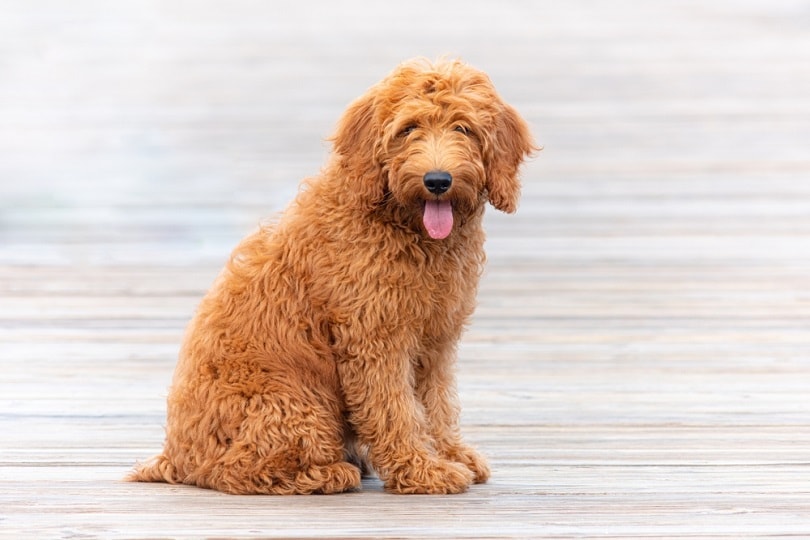
Health and Conditions
Crossbreeding minimizes health issues somewhat due to genetic diversity. Goldendoodles don’t have any breed-specific health problems but can develop issues commonly found in Golden Retrievers and Poodles.
Both Poodles and Golden Retrievers are prone to hip dysplasia, so this can be a concern in Goldendoodles. Other common issues among these breeds are eye problems and ear infections. Regular eye checks with a vet are recommended, and making sure your Goldendoodles ear canal remains dry will help mitigate any ear issues, especially if they have big, droopy ears.
Due to the Goldendoodle’s thick coat, atopic dermatitis can be a common ailment. If you notice your dog scratching and itching incessantly, a trip to the vet is in order. What’s less common but still possible among Goldendoodles is epilepsy. Its severity can vary and minor epilepsy doesn’t require treatment.
It is widely recommended to neuter males and spay females unless you intend on breeding. This has many associated health benefits. For males, it can prevent testicular cancer, lessen aggression, and prevent them from wandering off looking for females, which can get them lost or injured. Spaying a female will assist in preventing uterine infections and cancer. It is recommended to spay a female before her first heat, as this will help prevent these complications. If you intend to breed a female Goldendoodle, you should wait until she has experienced at least one or two heat cycles, as it is far better for her health.
- Skin disorders
- Eye disorders
- Cancer
- Hip dysplasia
- Epilepsy
Male vs. Female
An important factor to consider when getting a Goldendoodle puppy is whether to get a male or female. As with many other dog breeds, the females are slightly smaller than the males.
Male Goldendoodles are generally more affectionate and easier to train, but they mature slower than females, so you’ll need to wait a bit longer to get them started. Female Goldendoodles are more prone to mood swings.
However, an important distinction needs to be made between neutered and spayed dogs. The latter are more calm and less aggressive. In Golden Retrievers, there is almost no noticeable difference between a male and female’s character once they have undergone these procedures.
With all this in mind, it’s important to remember that all dogs, males or females, have unique personalities that can differ greatly, even in the same sex or litter. The common traits for males and females are generalizations and mostly drawn from anecdotes from Goldendoodle owners. A dog’s behavior and personality are far more affected by their upbringing and environment than their sex.
Final Thoughts: Goldendoodles
The Goldendoodle is a beautiful, unique, and lovable dog that is suited perfectly for families. They have a low tendency for barking, which is not great if you’re looking for a guard dog but perfect if you enjoy silence around your home. They are great with children and will attach themselves to them quickly, providing them with hours of fun and interactive playtime.
The biggest benefit of owning a Goldendoodle is the lack of shedding, but the coat will still need regular maintenance. While these dogs can be expensive, their adorable nature and fun, sweet temperament are more than worth it.
Featured Image: Josh Fields from Pexels








